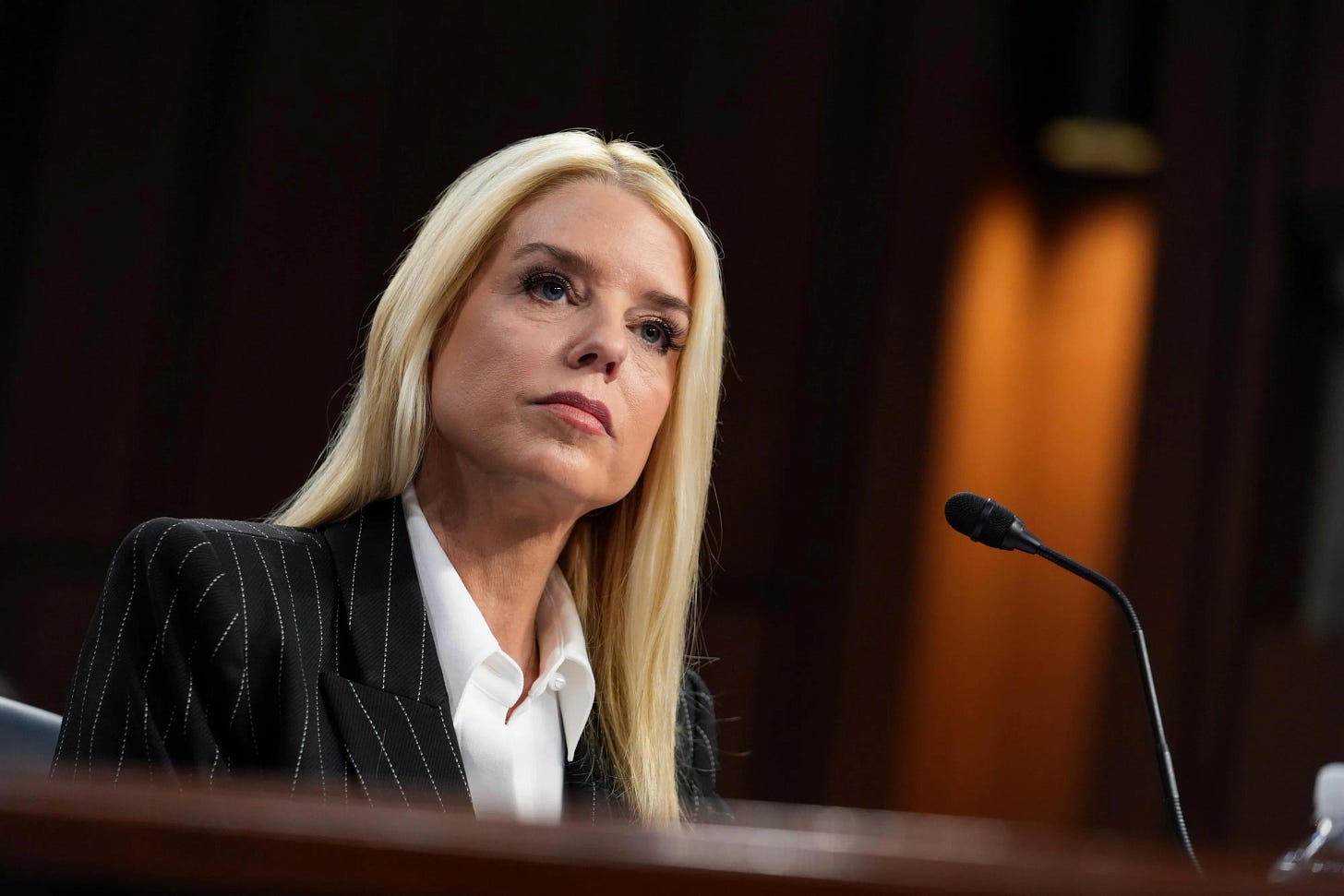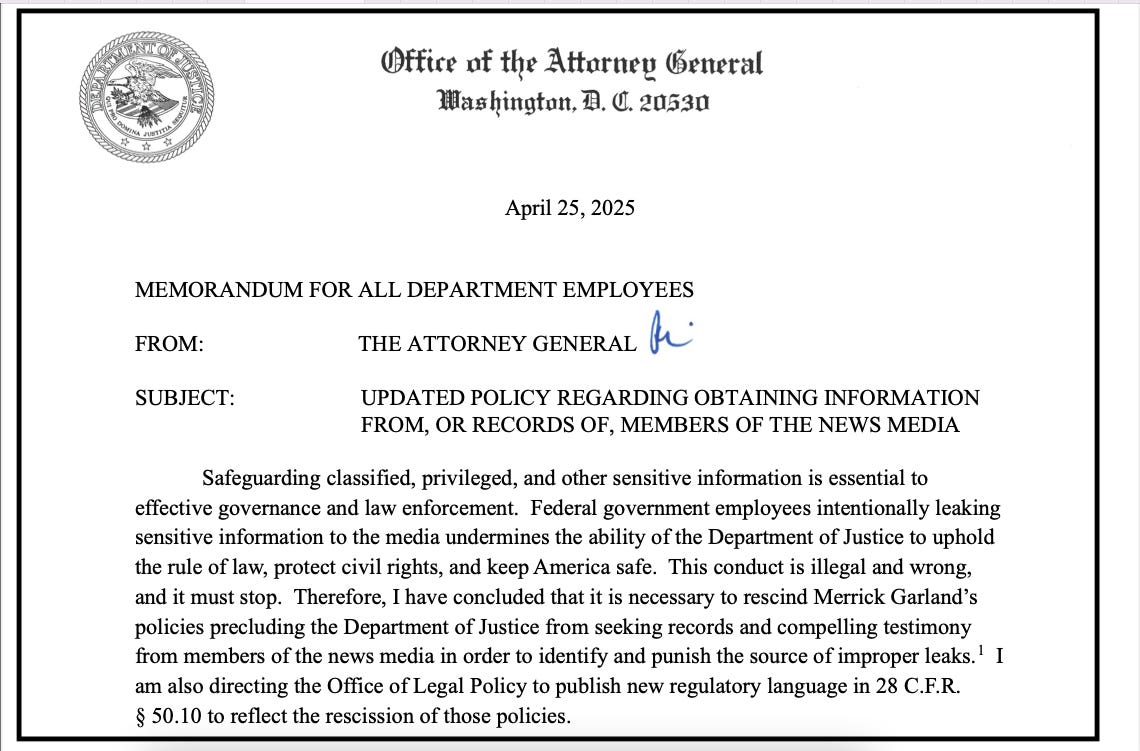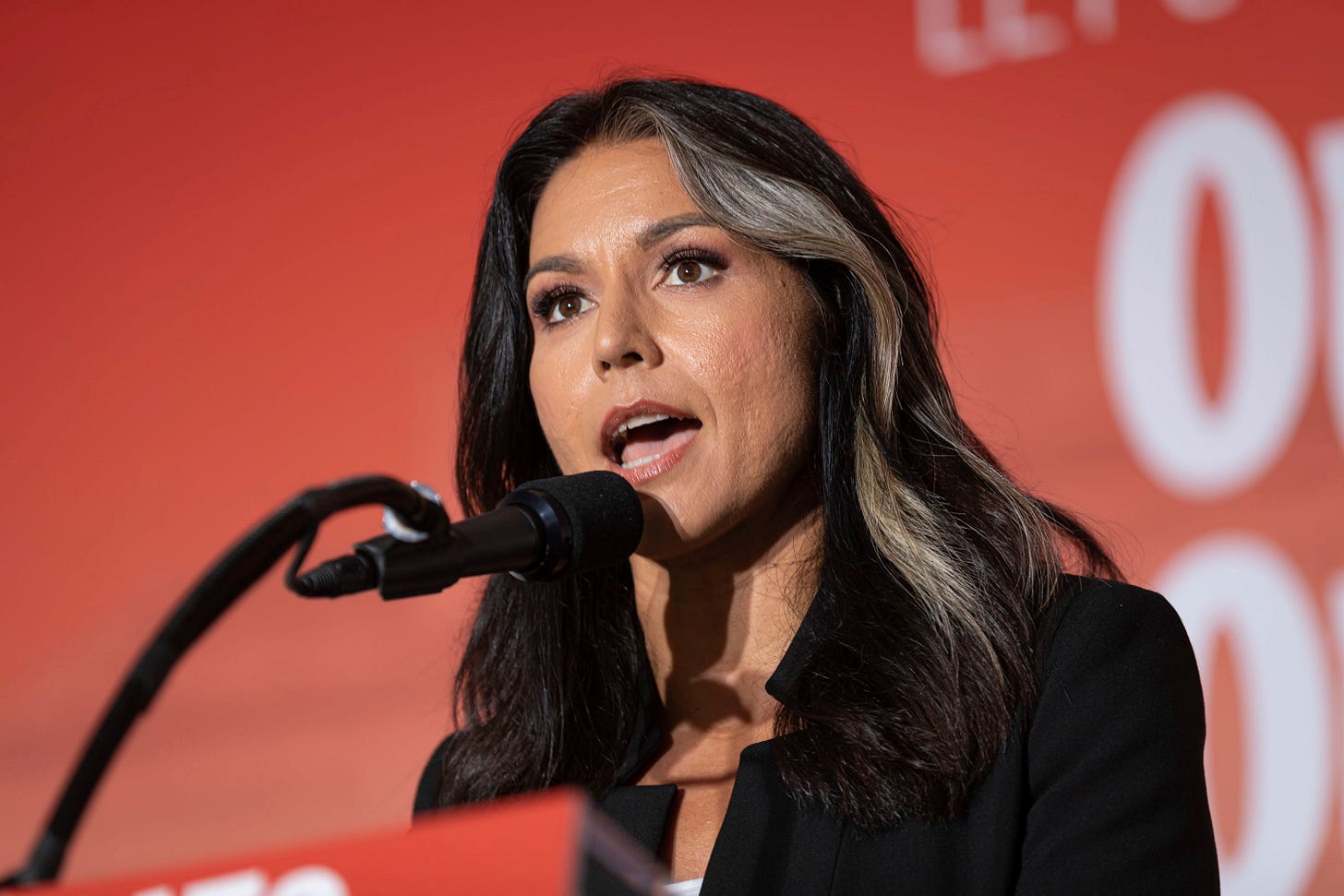Trump’s war on leaks - is journalism the next casualty?
Trump promised to protect free speech. But a new DOJ memo is raising fresh fears about the future of journalism.
When Donald Trump returned to office in 2025, he vowed to "end the weaponization of government censorship once and for all."
His Executive Order — Restoring Freedom of Speech and Ending Federal Censorship — was welcomed by many, including myself.
As a journalist — even one who focuses mainly on medicine, science, and public health — the idea that the federal government would no longer collude with media giants to control speech was a breath of fresh air.
After years of watching legitimate dissent silenced across digital platforms, a genuine commitment to free expression seemed not only necessary, but long overdue.
Now, that optimism is being tested.
On April 25, Trump's Attorney General, Pam Bondi, issued a new memorandum updating the Department of Justice’s (DOJ) policies on how information involving members of the press should be handled.
It has many questioning whether the administration’s commitment to a free press is as solid as promised.
The Left, in particular, responded immediately and fiercely.
The Left says Trump will “destroy journalism”
Within hours of Bondi’s memo being made public, left-leaning outlets warned that the new administration was on the verge of crushing press freedoms.
Newsweek ran the headline, "Trump Admin Rolls Back Biden Protections for Journalists" suggesting the new rules would force reporters to testify about their sources or turn over their notes.
Other warned of the "chilling effect" for investigative journalism, framing Bondi’s policy as a thinly veiled attempt to intimidate reporters and whistleblowers.
Social media commentary was even more dire, with predictions of the "criminalisation" of journalism and declarations that "press freedom is dead."
These voices suggested that Bondi’s memo was a blueprint for gutting the First Amendment and silencing dissent.
But once I read the memo for myself, the reality appeared less clear cut — though I remain cautious.
Bondi’s memo
The memo focuses squarely on stopping government insiders from leaking classified information — a crime that can seriously undermine national security, diplomatic relations, and public trust.
"Safeguarding classified, privileged, and other sensitive information is essential to effective governance and law enforcement," Bondi wrote, arguing that intentional leaks by federal employees weaken the DOJ’s ability to uphold the rule of law and protect civil rights.
Bondi’s memo rolls back some of the protections introduced by former Attorney General Merrick Garland, in order to restore the DOJ’s ability to investigate leaks under strict conditions.
Under the new policy, journalists can only be targeted if certain criteria are met:
There must be reasonable grounds to believe a crime has been committed;
The information sought must be essential to a successful prosecution;
And all reasonable alternative efforts must have been exhausted.
Bondi argued that this was not about silencing the press: "Investigative techniques relating to newsgathering are an extraordinary measure to be deployed as a last resort."
In other words, the DOJ must try every other avenue before compelling a journalist to reveal information.
Bondi also said that her sights are set not on the media, but on government employees leaking classified information to advance political agendas.
She accused the Biden administration of encouraging "selective leaks" to fuel politically motivated investigations — a reference to the "lawfare" tactics that drove several high-profile legal actions against Trump and his allies.
She did not shy away from strong language, warning that disclosing classified material "for personal enrichment" or to undermine US interests "could properly be characterized as treasonous."
Gabbard’s warns of deep-state
The memo comes on the heels of a warning from Tulsi Gabbard, now serving as Director of National Intelligence, who revealed that she had already referred two criminal leak investigations to the DOJ, with a third pending — including one reportedly involving an illegal disclosure to The Washington Post.
"Politicization of our intelligence and leaking classified information puts our nation’s security at risk and must end," Gabbard wrote on X, vowing that those responsible would be "held accountable to the fullest extent of the law."
Gabbard did not frame the leaks as whistleblowing. She described them as acts of sabotage by "deep-state criminals" seeking to thwart Trump’s policy agenda.
Bondi’s memo seems part of a broader effort to reclaim control over classified information — treating politically motivated leaks as national security threats, not as acts of noble resistance.
The delicate balance
Even well-intentioned policies can have unintended consequences. Powers designed to stop leaks can easily morph into tools for suppressing inconvenient reporting.
Measures intended to protect national security or government secrets can create a chilling effect — discouraging sources, even those exposing genuine wrongdoing, from coming forward.
History offers plenty of cautionary tales.
During the Obama administration, aggressive leak prosecutions — including the secret seizure of Associated Press phone records — sparked outrage from press freedom groups. In response, Garland’s reforms under Biden sought to restrain the DOJ’s investigative reach.
Biden's administration also leaned heavily on digital censorship to protect itself from criticism, pressuring tech platforms to suppress Covid-19 dissenters — sweeping up journalists like Alex Berenson in covert campaigns to silence inconvenient voices.
The lesson?
Governments, regardless of ideology, have consistently found ways to control narratives when it suits them — whether through surveillance, censorship, or strategic leaks.
Trump has made no secret of his contempt for the legacy media — branding them as "fake news" and the "enemy of the people."
And while the current focus may be on classified leaks, granting broader investigative powers over journalists opens the door to potential future abuse - perhaps by another Attorney General, in another administration, for entirely different purposes?
That’s the real danger. Abuse doesn’t need to happen today. It just needs to remain possible. And history shows that no government, Left or Right, can resist the temptation to censor or punish dissent.
Why independent journalism matters
As a journalist, I understand the need to protect national security but safeguarding it must never become an excuse to silence legitimate scrutiny — or intimidate journalists whose role is to hold the powerful to account — or to punish whistleblowers exposing real wrongdoing.
A free and independent press is not a luxury. It is the foundation of a functioning democracy — a critical check on those who would prefer to operate in the shadows.
Freedom of the press doesn’t just protect journalists, it protects your right to know.
Today, as much of corporate media increasingly aligns itself with political narratives, truly independent journalism matters more than ever.
If you value reporting that questions authority rather than parrots it, I hope you’ll consider supporting my work.





I am getting tired of the art of leaking. Some politicians use it to advance their agenda by undermining the process of government and the need for security. Then disgruntled employees of government use it to undermine their employers. We really don’t need to know everything all the time at the time of it happening.
Maryanne notes "And history shows that no government, Left or Right, can resist the temptation to censor or punish dissent." Quite right! The hallmark of all dictatorships is they begin by "criminalising/imprisoning or murdering" folks for free expression - (and this frightens everybody to remain silent about terrible things). Really, this is just the same by THREATENING journos & anyone with "financial murder", "selective prosecutions" & "law-fare" eg. Mary Kosakidis. BTW it also corruptly enriches others from ridiculously long "legal" processes for years & years. Assange was never even charged and was effectively "detained" by use of "law-fared" for about 15yrs. These rules are further dangerous departures from rights of free expression in USA & our traditional "rights", which BTW, are defined as inalienable rights under The Universal Declaration of Human Rights.